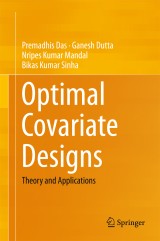Details

Optimal Covariate Designs
Theory and Applications|
CHF 59.00 |
|
| Verlag: | Springer |
| Format: | |
| Veröffentl.: | 23.07.2015 |
| ISBN/EAN: | 9788132224617 |
| Sprache: | englisch |
Dieses eBook enthält ein Wasserzeichen.
Beschreibungen
This book primarily addresses the optimality aspects of covariate designs. A covariate model is a combination of ANOVA and regression models. Optimal estimation of the parameters of the model using a suitable choice of designs is of great importance; as such choices allow experimenters to extract maximum information for the unknown model parameters. The main emphasis of this monograph is to start with an assumed covariate model in combination with some standard ANOVA set-ups such as CRD, RBD, BIBD, GDD, BTIBD, BPEBD, cross-over, multi-factor, split-plot and strip-plot designs, treatment control designs, etc. and discuss the nature and availability of optimal covariate designs. In some situations, optimal estimations of both ANOVA and the regression parameters are provided. Global optimality and D-optimality criteria are mainly used in selecting the design. The standard optimality results of both discrete and continuous set-ups have been adapted, and several novel combinatorial techniques have been applied for the construction of optimum designs using Hadamard matrices, the Kronecker product, Rao-Khatri product, mixed orthogonal arrays to name a few.
<p><b>Chapter 1. </b>Optimal Covariate Designs: Scope of the Monograph.- <b>Chapter 2. </b>OCDs in Completely Randomized Design Set-Up.- <b>Chapter 3.</b> OCDs in Randomized Block Design Set-Up.- <b>Chapter 4.</b> OCDs in Balanced Incomplete Block Design Set-Up.- <b>Chapter 5.</b> OCDs in Group Divisible Design Set-Up.- <b>Chapter 6. </b>OCDs in Binary Proper Equireplicate Block Design Set-Up.- <b>Chapter 7.</b> OCDs in Balanced Treatment Incomplete Block Design Set-Up.- <b>Chapter 8.</b> Miscellaneous other Topics and Issues.- <b>Chapter 9.</b> Applications of the Theory of OCDs.</p>
<p><b>Premadhis Das</b> is a Senior Professor in the Department of Statistics, University of Kalyani, India. He has been working in the area of Design of Experiments for more than 30 years, and has published research articles in many national and international journals of repute. Prof. Das has co-authored a Springer-Verlag Lecture Notes Series in Statistics monograph on optimal mixture experiments, Vol. 1028, 2014.</p><p><b>Ganesh Dutta</b> is an Assistant Professor, Department of Statistics, Basanti Devi College, affiliated to the University of Calcutta, India. He has completed his Ph.D. degree in the area of design of experiments from the University of Calcutta in the year 2009 and has published 11 research articles in the area of optimum covariate designs in all reputed peer-reviewed journals.</p><p><b>Nripes Kumar Mandal</b> is a senior faculty member of the Department of Statistics, University of Calcutta, India. He has visited many countries for collaborative research and has published about 70 research articles in peer-reviewed journals. He has been associated with many international statistical journals of repute as a reviewer. Professor Mandal has co-authored two Springer-Verlag Lecture Notes Series in Statistics monograph on optimal designs,Vol. 163, 2002 and monograph on optimal mixture experiments, Vol. 1028, 2014.</p><p><b>Bikas Kumar Sinha</b> was attached to the Indian Statistical Institute [ISI], Kolkata, India for more than 30 years until his retirement on March 31, 2011. He has travelled extensively within USA and Europe for collaborative research and with teaching assignments. He has more than 120 research articles published in peer-reviewed journals and has acted as a referee for many international journals. Professor Sinha has served in the Editorial Board of statistical journals including <i>Sankhya</i>, <i>Journal of Statistical Planning and Inference</i> and <i>Calcutta Statistical Association Bulletin</i>. He has co-authored three Spri</p>nger-Verlag Lecture Notes Series in Statistics monographs on optimal designs [Vol. 54, 1989, Vol. 163, 2002 and Vol. 1028, 2014].</p>
<p>This book primarily addresses the optimality aspects of covariate designs. A covariate model is a combination of ANOVA and regression models. Optimal estimation of the parameters of the model using a suitable choice of designs is of great importance; as such choices allow experimenters to extract maximum information for the unknown model parameters. The main emphasis of this monograph is to start with an assumed covariate model in combination with some standard ANOVA set-ups such as CRD, RBD, BIBD, GDD, BTIBD, BPEBD, cross-over, multi-factor, split-plot and strip-plot designs, treatment control designs, etc. and discuss the nature and availability of optimal covariate designs. In some situations, optimal estimations of both ANOVA and the regression parameters are provided. Global optimality and D-optimality criteria are mainly used in selecting the design. The standard optimality results of both discrete and continuous set-ups have been adapted, and several novel combinatorial techniques have been applied for the construction of optimum designs using Hadamard matrices, the Kronecker product, Rao-Khatri product, mixed orthogonal arrays to name a few.</p>
Examines the optimality aspects of covariate designs for estimating the covariate parameters of different models Utilizes novel combinatorial techniques in constructing optimal covariate designs Provides a wide range of applications in areas like industry, agriculture, clinical trials, chemical processes, etc Includes supplementary material: sn.pub/extras

















